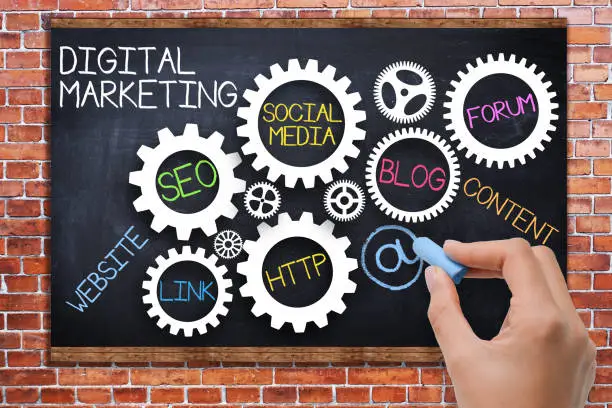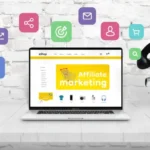Digital marketing is one of the most in-demand career paths today. With the global shift toward digital channels, brands and businesses are investing more in digital marketing than ever before. Whether you’re a freelancer, agency owner, or in-house professional, developing the right skill set is critical to stand out and drive ROI. In this guide, we’ll explore the 10 essential digital marketing skills every professional must master in 2025 and beyond.
In today’s digital-first world, the role of a digital marketer is critical to the success of any business. They are responsible for planning, executing, and analyzing marketing campaigns across various online channels. A well-rounded digital marketer must combine creativity with data-driven decision-making to effectively reach and engage target audiences.
1. Search Engine Optimization (SEO)
Why It Matters:
SEO remains the cornerstone of digital marketing. Whether you’re running a blog, managing an e-commerce site, or handling a corporate website, SEO can determine how visible you are on search engines.
Key Subskills:
-
On-page SEO (keywords, meta tags, schema)
-
Technical SEO (site speed, mobile responsiveness)
-
Off-page SEO (backlinks, authority building)
-
Local SEO and Google Business Profile optimization
High CPC Benefit:
Keywords in niches like finance, insurance, and legal industries have the highest CPC rates. Ranking for those through SEO can directly increase AdSense earnings.
2. Pay-Per-Click (PPC) Advertising
Why It Matters:
PPC advertising, particularly via Google Ads and Bing Ads, allows marketers to instantly generate traffic and leads. Mastery of PPC enables high ROI campaigns and quick testing of new offers.
Key Subskills:
-
Google Ads campaign creation
-
Keyword bidding and research
-
Ad copywriting
-
A/B testing for conversions
High CPC Benefit:
PPC advertising itself is a high CPC topic, and understanding it positions your content in a high-monetization niche for AdSense.
3. Content Marketing and Copywriting
Why It Matters:
Great content not only drives organic traffic but also converts readers into customers. Strong writing engages audiences and supports SEO efforts.
Key Subskills:
-
Blogging and long-form content
-
Persuasive copywriting (for ads, landing pages, emails)
-
Storytelling
-
Content calendars and editorial planning
High CPC Benefit:
Content around “copywriting for conversions,” “content strategy,” and “content ROI” ranks well.
4. Email Marketing and Automation
Why It Matters:
Despite being one of the oldest digital marketing channels, email marketing consistently delivers a high ROI. Automation tools like Mailchimp, Klaviyo, and HubSpot streamline the process.
Key Subskills:
-
List segmentation
-
Drip campaign creation
-
A/B testing subject lines
-
Deliverability and compliance (CAN-SPAM, GDPR)
High CPC Benefit:
Email marketing for e-commerce and B2B sectors typically carries high CPC terms, particularly if linked to conversion tracking and CRM integration.
5. Data Analytics and Google Analytics 4 (GA4)
Why It Matters:
Understanding how users interact with your website is vital. GA4 has replaced Universal Analytics, and mastering it is now mandatory for marketers.
Key Subskills:
-
GA4 event tracking
-
Funnel visualization
-
Audience segmentation
-
UTM parameter tracking
High CPC Benefit:
Articles around GA4, data analysis, and tracking tools are gaining attention and have high monetization potential due to rising demand.
6. Social Media Strategy
Why It Matters:
Social media drives brand awareness, engagement, and even direct conversions. With platforms like Instagram, TikTok, LinkedIn, and X (formerly Twitter), marketers must tailor strategies to each.
Key Subskills:
-
Social content planning
-
Paid social advertising (Meta Ads, LinkedIn Ads)
-
Influencer marketing
-
Community management
High CPC Benefit:
“Social media management for business,” “LinkedIn advertising,” and “influencer ROI” are CPC-friendly topics.
7. Conversion Rate Optimization (CRO)
Why It Matters:
It’s not just about driving traffic—it’s about converting that traffic into leads or sales. CRO focuses on improving user experience to increase on-site conversions.
You Can Also Read: The Difference Between Social Media Management and Community Management
Key Subskills:
-
Heatmap and session recording tools (Hotjar, Crazy Egg)
-
A/B testing (landing pages, call-to-action buttons)
-
User behavior analysis
-
Funnel optimization
High CPC Benefit:
Conversion-focused articles in B2B, SaaS, and fintech niches perform well in terms of both traffic and monetization.
8. Marketing Automation Tools
Why It Matters:
Time-saving and scalability are crucial in digital marketing. Tools like HubSpot, ActiveCampaign, and Zapier allow marketers to automate tasks without sacrificing personalization.
Key Subskills:
-
Workflow design
-
CRM integration
-
Lead scoring
-
Behavioral triggers
High CPC Benefit:
Keywords like “best marketing automation tools for business,” “CRM workflows,” and “AI in marketing” are hot CPC targets.
9. Video Marketing and YouTube SEO
Why It Matters:
Video content has become a dominant force online. With platforms like YouTube being the second-largest search engine, video marketing can’t be ignored.
Key Subskills:
-
Video scriptwriting and editing
-
YouTube SEO and thumbnail optimization
-
Livestreaming strategy
-
Video ads and retargeting
High CPC Benefit:
Topics like “YouTube monetization,” “video ad ROI,” and “YouTube SEO strategy” attract high AdSense bids, especially from tech advertisers.
10. Affiliate and Influencer Marketing
Why It Matters:
Affiliate marketing offers scalable passive income, and influencer partnerships provide social proof and reach. Both are critical in performance-based digital marketing.
Key Subskills:
-
Partner network management
-
Influencer outreach
-
Commission structure design
-
Tracking and attribution
High CPC Benefit:
“Affiliate programs for high ticket items,” “influencer marketing ROI,” and “affiliate tracking tools” rank highly in CPC.
Frequently Asked Questions
1. What does a digital marketer do?
A digital marketer creates, manages, and optimizes online marketing campaigns to increase brand awareness, drive traffic, and convert leads into customers. They work across channels like search engines, social media, email, and websites.
2. How do I become a digital marketer?
To become a digital marketer, you can:
-
Take online courses (Google, HubSpot, Coursera)
-
Learn tools like Google Ads, Analytics, and SEO software
-
Gain experience through internships or freelance projects
-
Build a portfolio and get certified
3. Is digital marketing a good career?
Yes. Digital marketing is a high-demand, high-growth field with diverse roles and competitive salaries. It also offers flexibility, remote work opportunities, and entrepreneurial potential.
4. Can I start digital marketing with no experience?
Yes. Many digital marketers start with self-study, online courses, and small freelance projects. Building a blog, social media presence, or YouTube channel can also serve as hands-on experience.
Conclusion
Becoming a successful digital marketer in 2025 means combining technical know-how with creative execution. By mastering these 10 essential skills, not only do you increase your value in the job market, but you also create opportunities for your business, affiliate marketing, and digital products.
Whether you’re aiming to build a personal brand, grow a business, or launch a marketing agency, these skills will form your foundation for long-term success.
References
You Can Also Read
The Difference Between Social Media Management and Community Management
The Difference Between Social Media Marketing & Social Media Management



